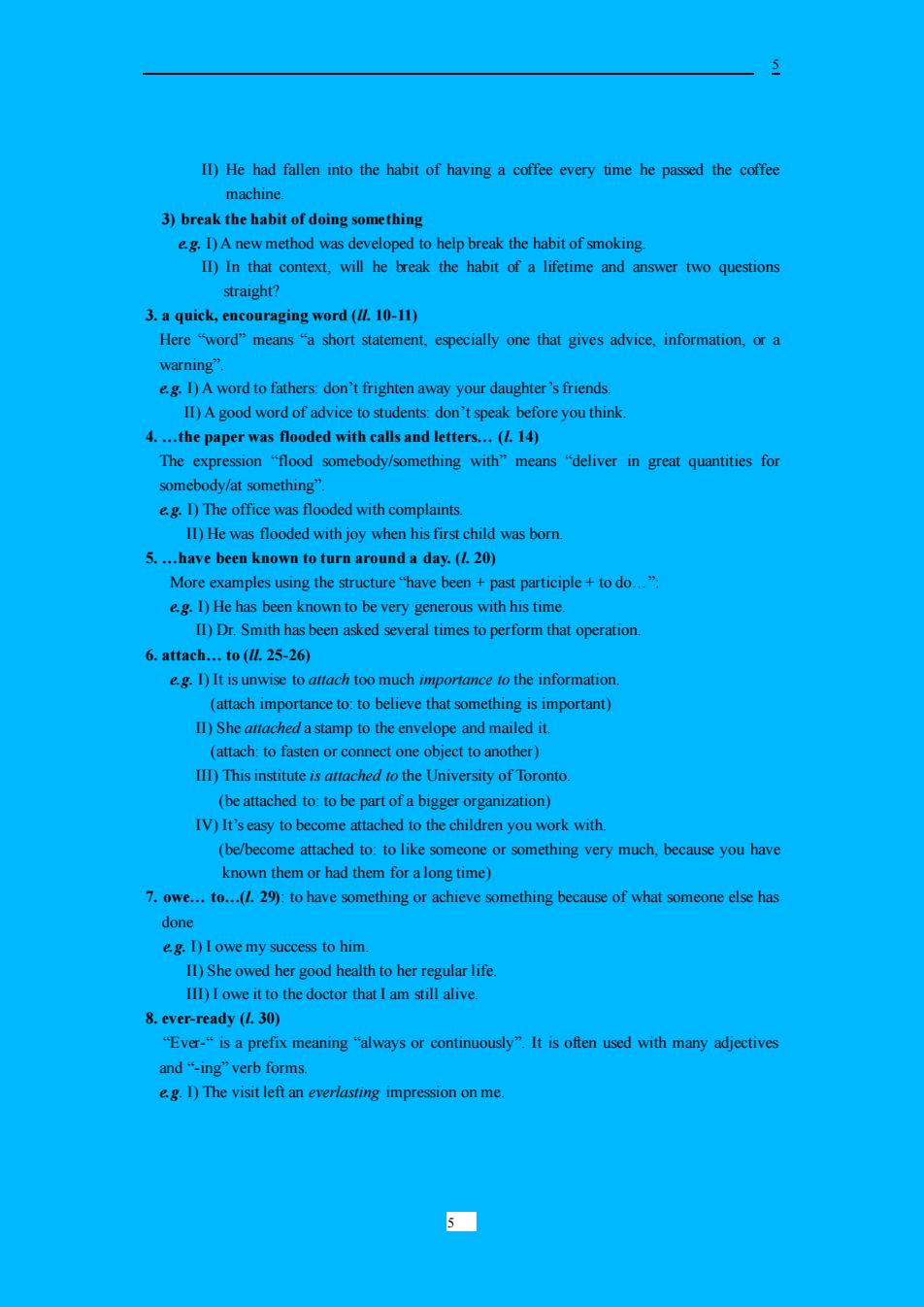正在加载图片...

II)He had fallen into the habit of having a coffee every time he passed the coffee machine. 3)break the habit of doing something eg.I)A new method was developed to help break the habit of smoking. II)In that context,will he break the habit of a lifetime and answer two questions straight? 3.a quick,encouraging word (ll.10-11) Here "word"means "a short statement,especially one that gives advice,information,or a warning". eg.I)A word to fathers:don't frighten away your daughter's friends. II)A good word of advice to students:don't speak before you think. 4....the paper was flooded with calls and letters...(L.14) The expression "flood somebody/something with"means "deliver in great quantities for somebody/at something". eg.I)The office was flooded with complaints. Il)He was flooded with joy when his first child was born. 5....have been known to turn around a day.(L 20) More examples using the structure"have been+past participle+to do...". e.g.I)He has been known to be very generous with his time. II)Dr.Smith has been asked several times to perform that operation. 6.attach...to (I.25-26) e.g.I)It is unwise to attach too much importance to the information. (attach importance to:to believe that something is important) II)She attached a stamp to the envelope and mailed it. (attach:to fasten or connect one object to another) Ill)This institute is attached to the University of Toronto (be attached to:to be part of a bigger organization) IV)It's easy to become attached to the children you work with. (be/become attached to:to like someone or something very much,because you have known them or had them for a long time) 7.owe...to...(I.29):to have something or achieve something because of what someone else has done eg.I)I owe my success to him. Il)She owed her good health to her regular life. III)I owe it to the doctor that I am still alive. 8.ever-ready (I.30) “Ever-“is a prefix meaning“always or continuously”.It is often used with many adjectives and“-ing”verb forms. e.g.I)The visit left an everlasting impression on me. 55 5 II) He had fallen into the habit of having a coffee every time he passed the coffee machine. 3) break the habit of doing something e.g. I) A new method was developed to help break the habit of smoking. II) In that context, will he break the habit of a lifetime and answer two questions straight? 3. a quick, encouraging word (ll. 10-11) Here “word” means “a short statement, especially one that gives advice, information, or a warning”. e.g. I) A word to fathers: don’t frighten away your daughter’s friends. II) A good word of advice to students: don’t speak before you think. 4. …the paper was flooded with calls and letters… (l. 14) The expression “flood somebody/something with” means “deliver in great quantities for somebody/at something”. e.g. I) The office was flooded with complaints. II) He was flooded with joy when his first child was born. 5. …have been known to turn around a day. (l. 20) More examples using the structure “have been + past participle + to do…”: e.g. I) He has been known to be very generous with his time. II) Dr. Smith has been asked several times to perform that operation. 6. attach… to (ll. 25-26) e.g. I) It is unwise to attach too much importance to the information. (attach importance to: to believe that something is important) II) She attached a stamp to the envelope and mailed it. (attach: to fasten or connect one object to another) III) This institute is attached to the University of Toronto. (be attached to: to be part of a bigger organization) IV) It’s easy to become attached to the children you work with. (be/become attached to: to like someone or something very much, because you have known them or had them for a long time) 7. owe… to…(l. 29): to have something or achieve something because of what someone else has done e.g. I) I owe my success to him. II) She owed her good health to her regular life. III) I owe it to the doctor that I am still alive. 8. ever-ready (l. 30) “Ever-“ is a prefix meaning “always or continuously”. It is often used with many adjectives and “-ing” verb forms. e.g. I) The visit left an everlasting impression on me